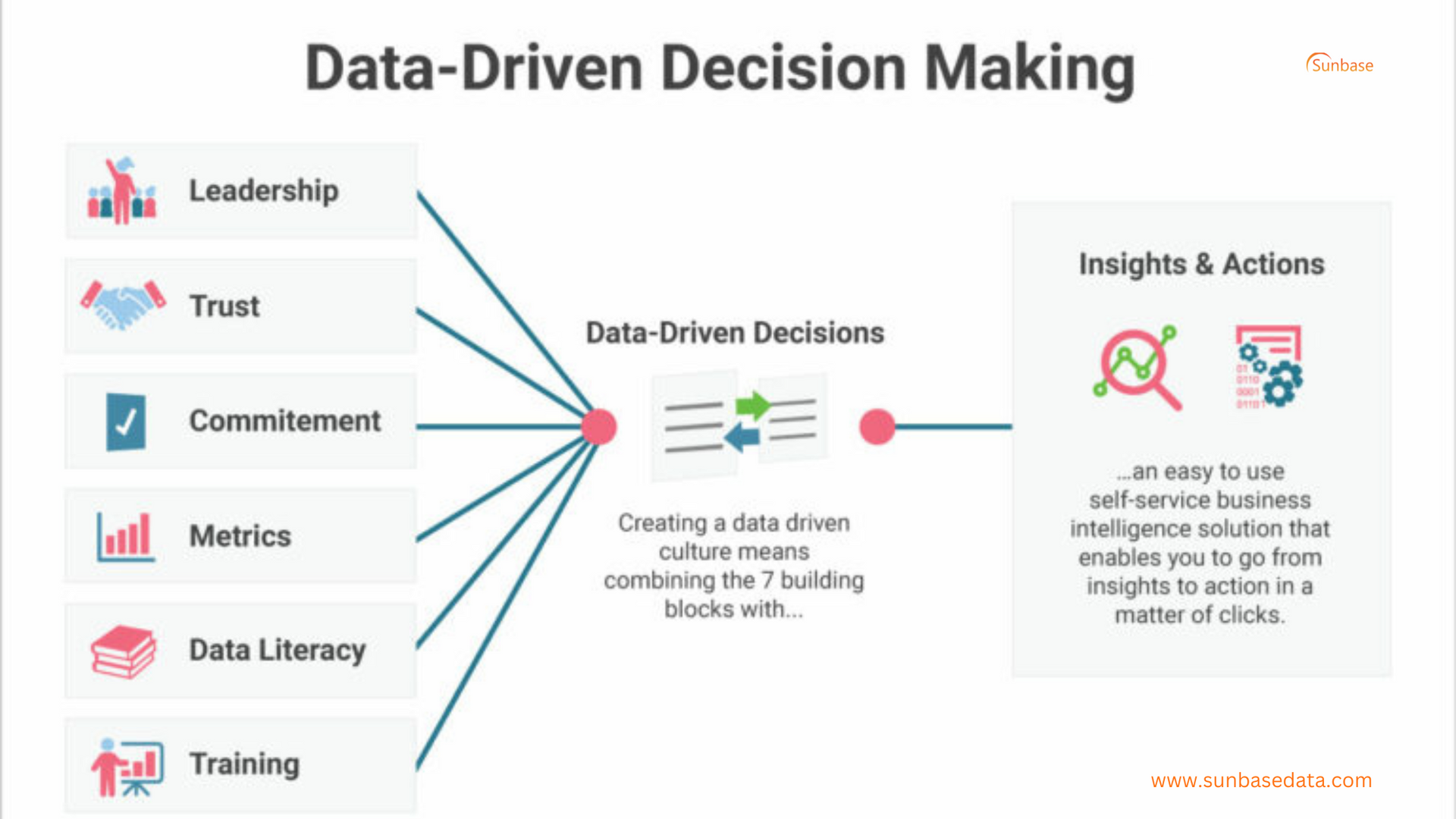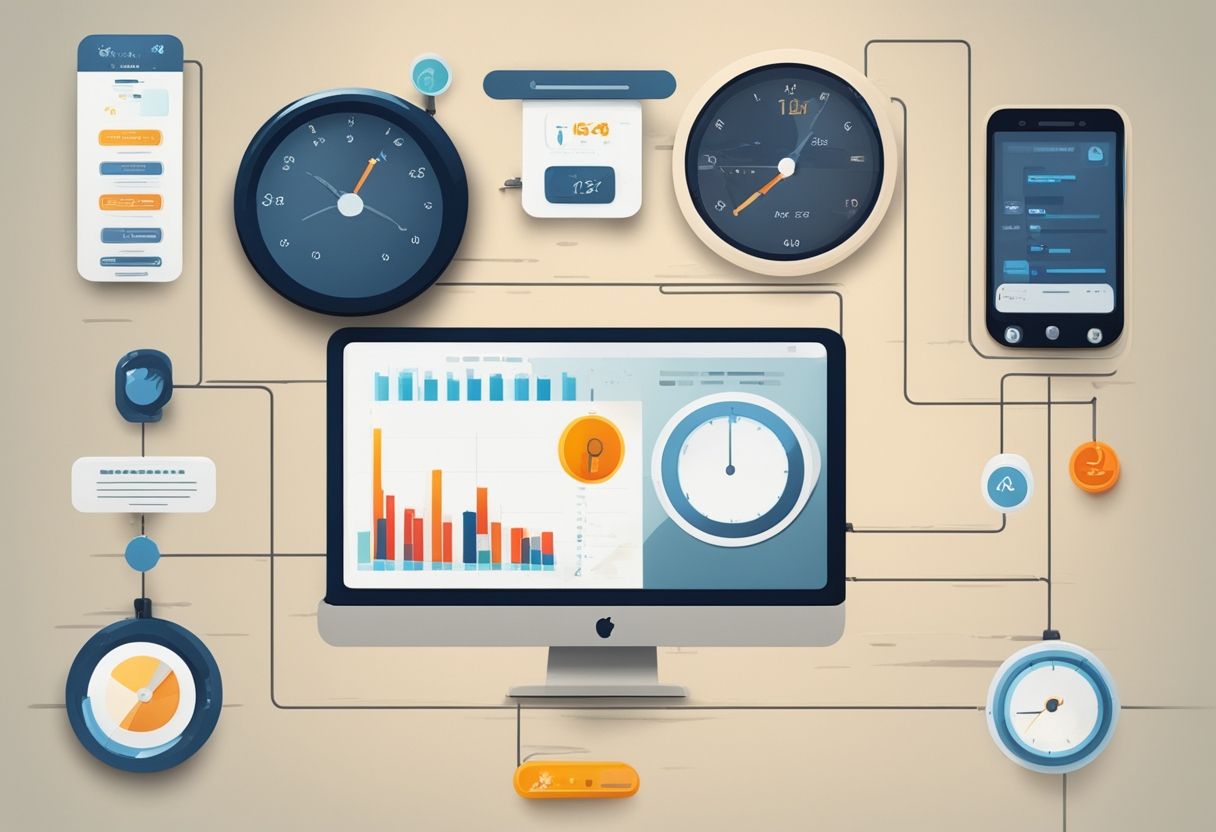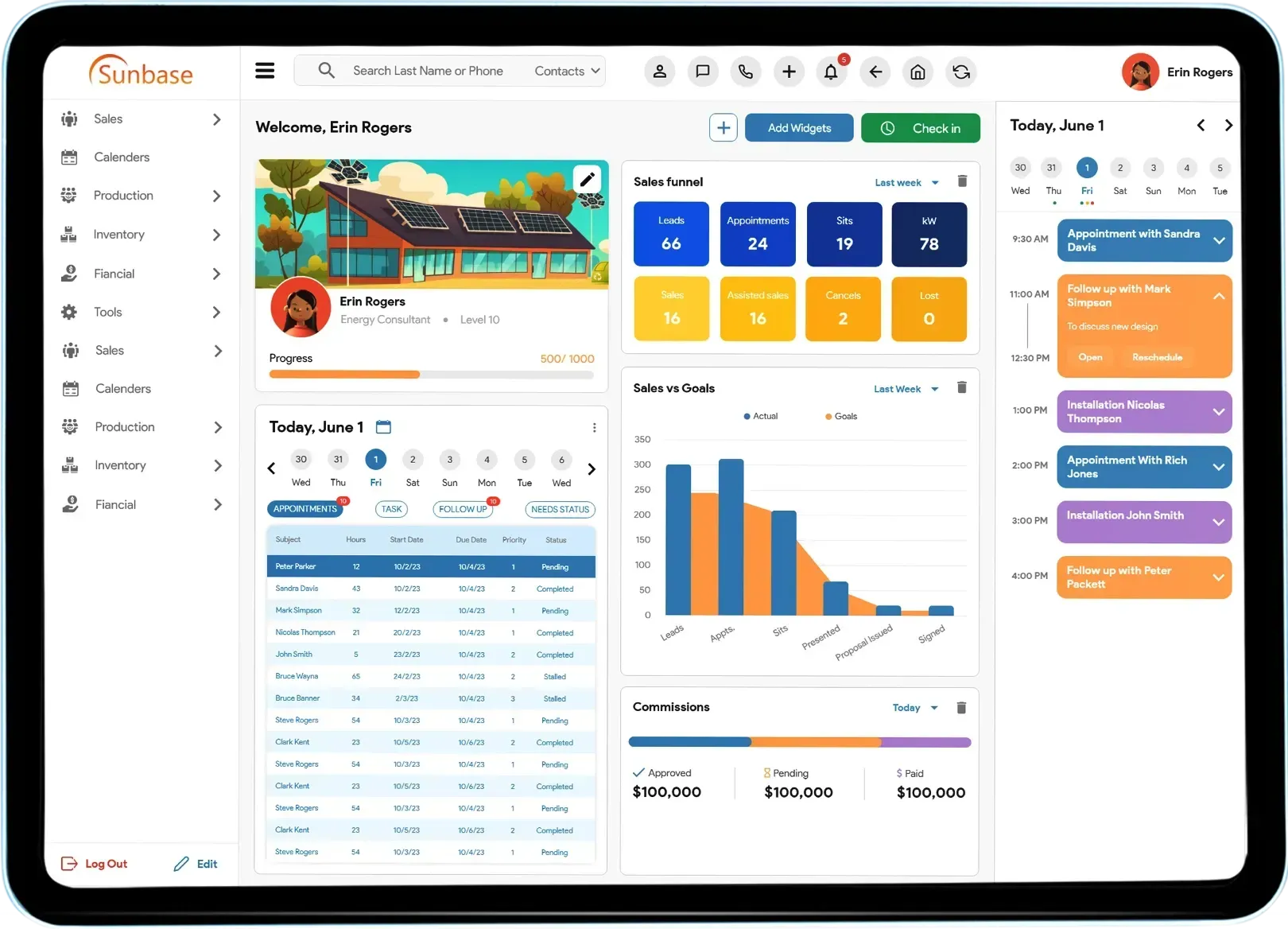May 27, 2024
The solar industry is experiencing a transformative shift towards data-driven decision-making, with studies indicating that companies leveraging data-driven insights are 23% more likely to outperform their competitors.
According to a recent industry report, solar power companies that have adopted data-driven decision-making strategies have seen a 15% increase in project efficiency and a 20% reduction in operational costs.
Sunbase emerges in this dynamic landscape as a beacon of innovation, offering solar energy system companies a comprehensive solution to harness the power of data for informed decision-making and operational excellence.
This all-in-one software solution empowers solar companies to optimize solar panel system and residential solar projects with effective data utilization.
First, what is Data-Driven Decision-Making?
Data-driven decision-making is a strategic approach that involves collecting data based on key performance indicators (KPIs) and transforming this data into actionable insights to inform decision-making processes. It is a fundamental element of modern business strategy, enabling organizations to make informed decisions based on factual evidence rather than biases or emotions.

Utilizing tools like business intelligence reporting and data visualization, companies can analyze patterns, trends, and insights derived from data to guide their decision-making processes effectively.
This method allows businesses to optimize operations, drive profitability, enhance team performance, and improve overall outcomes by leveraging data to make objective and informed choices. Some key benefits of Data-Driven Decision-Making include:
- Making decisions based on facts rather than biases or emotions
- Enhancing operational efficiency and productivity
- Driving profitability and business growth
- Improving team performance and outcomes
- Enabling more informed and strategic decision-making
Overall, Data-Driven Decision-Making is a crucial component of modern business strategy, empowering organizations to leverage data and analytics to make objective, evidence-based decisions that lead to improved performance and outcomes.
What is the Importance of Data in Solar Energy?
Data plays an important role in the solar energy sector across several dimensions, significantly impacting efficiency, cost reduction, and scalability. Let's learn about the importance in detail:
1. Enhancing Efficiency
To make solar energy systems work better, data helps get more power from the sun. This involves watching how the system works, fixing problems before they happen, predicting weather patterns to use sunlight better, and adjusting solar panels to catch more sunlight. Let's dig deeper.
1.1. Real-time monitoring

The continuous collection of the data from the solar panels enables the real-time monitoring of performance and helps in identifying inefficiencies such as shading, dirt, or technical faults in the solar installation. This approach is used by leading solar panel installation companies and other solar companies to ensure top performance.
1.2. Predictive Maintenance
By monitoring and managing the performance of the solar installations, we reduce operational costs through efficient resource allocation and timely maintenance.
1.3. Weather Forecasting
Machine learning algorithms study weather patterns to figure out if it will be sunny or cloudy, which helps the solar panels know when they can optimize the energy capture and store it for later use.
1.4. Solar Tracking Systems
The data-driven solar tracking system helps in adjusting the orientation of panels throughout the day, which leads to maximum sunlight capture and enhances overall energy efficiency. This helps answer the question of how much power can be generated.
2. Reducing Energy Costs
To make solar energy cheaper, use data to find ways to save money. This includes using less material, working more efficiently, predicting costs accurately, and setting fair prices.
Let's explore them in detail:
2.1. Material Optimization
The material usage by solar panel manufacturers can be analyzed and optimized with the help of data. This reduces waste and costs associated with solar installation.
2.2. Operational Efficiency

Monitoring and managing the performance of solar installations reduces operational costs through efficient remote allocation and timely maintenance, benefiting most solar companies and their customers.
2.3. Cost Prediction
The data analytics provides accurate cost production predictions for solar panel installation, maintenance, and operation, helping in better financial planning and budgeting for solar systems.
2.4. Energy Pricing
By using data on energy production and consumption patterns, price strategies can be informed, ensuring competitive and fair solar panel installation costs, which is crucial for other solar providers. This helps customers understand potential energy savings and impacts on electric bills.
3. Supporting Scalability of Solar Systems
Want solar energy to grow? Use data to make sure it can. This means making batteries better, balancing energy use, and picking the best places to put solar panels. Here's the explanation for a deeper understanding.
3.1. Optimizing Battery Storage
Data on energy production and consumption patterns helps optimize energy storage systems, ensuring a reliable supply even during low solar production periods.
3.2. Demand Response Strategies
Real-time data allows better integration with the grid through demand response strategies, balancing energy production and consumption dynamically, and supporting the scalability of solar system.
3.3. Site Selection Optimization

Using the data on solar irradiance, land use, and environmental impact helps in selecting the best sites for solar panel installation, ensuring maximum efficiency and minimal impact. This data helps in determining how many solar panels are needed for optimal performance.
3.4. Scaling Operations
Data-driven insights help expand existing installations or develop new ones using advanced solar equipment and solar panel technology. Knowing how many solar panels are needed based on accurate data ensures projects are cost-effective and efficient.
How Sunbase Supports Data-Driven Decision-Making?
Sunbase is the most comprehensive software platform that revolutionizes the solar industry and has become the gold standard in data analytics tools.
Through this program, companies can collect, sort out, and analyze information from multiple sources.
Sunbase has an easy-to-use interface that supports evidence-based decision-making by providing rich data sets, powerful analysis tools, and colorful visualizations.

Sunbase promotes innovation in renewable energy as it empowers solar companies to be more self-reliant when it comes to power generation. With the help of Sunbase, businesses can optimize PV panel efficiency rates; system designs & solar costs while incorporating wireless networks for smart appliances’ control or relying entirely on sunlight.
Sunbase enables a company to be the best in power production and home energy management whether one decides to deal with a major Solar installer or buy the best solar equipment.
For any solar installation company that is installing solar panels and is aiming to lead the market, Sunbase is the key to unlocking unparalleled success.
Here is how Solar Software helps solar companies in data-driven decision-making:
1. Data Collection
So, you know how important it is to gather data for keeping track of and enhancing solar energy systems, right? Well, it's all about using sensors to gather info, keeping it safe in the cloud, and getting real-time updates.
Let's take a closer look at how data collection works.
1.1. Advanced Sensors
Solar panels and associated quality equipment are equipped with advanced sensors that gather comprehensive information on energy generated and energy usage.
1.2. Cloud Storage
The entire dataset containing everything about energy generated and consumed is securely stored within the cloud for easy accessibility.
1.3. Real-time Data Acquisition
Data is collected instantly so that there are immediate updates concerning system performance, particularly on energy generation and consumption.
2. Data Analysis
Once all that data is collected, analyzing it is the key to turning raw info into useful insights. With the help of AI and user-friendly tools, solar companies can understand and optimize their systems better.
2.1. AI and Machine Learning
AI, as well as machine learning, examine data to minimize power consumption leading to increased system efficiency thereby helping businesses to save money.
2.2. User-friendly Dashboards and Analytics Tools
Data is presented in a simple way through dashboards that can be easily understood, offering insights into solar panel systems along with solar array performance.
2.3. Real-time Insights into System Performance and Productivity
Real-time updates are useful in providing valuable information about how the systems perform over time including areas such as energy usage, and how much sunlight the solar panels receive.
3. Optimizing Performance
When it comes to optimizing performance, the goal is to make sure solar systems run as efficiently as possible. This means comparing performance to industry standards, predicting maintenance needs, and analyzing profitability.
Here’s how performance is optimized:
3.1. Performance Benchmarking
Comparing how well solar panels perform compared to industry standards like the best solar companies in terms of efficiency or use.
3.2. Predictive Maintenance Strategies
Instead of waiting for things to break predictive maintenance looks ahead to anticipate maintenance needs. This keeps energy production running smoothly and cuts down on big upfront costs.
3.3. Financial Modeling and Profitability Analysis
Looking at factors like energy production, energy usage, solar costs, and leasing options helps predict how profitable things will be.
4. Enhanced Decision-Making
Enhanced decision-making is all about using data to guide long-term planning and improve operations. By keeping an eye on sales, project profitability, and team productivity, companies can make better strategic choices.
4.1. Monitoring Sales Pipelines and Project Profitability
Keep an eye on sales and profitability, factoring in energy production, usage, and the financial side of solar panel and home integration systems.
4.3. Improving Team Productivity and Operational Efficiency
Data-driven strategies boost team productivity and efficiency, like working with local installers to maximize energy production and making the most of more direct sunlight. This helps solar company to run things smoothly and reduces the energy bill.
What are the Benefits of Using Sunbase in data-driven decision-making?
1. Optimized Resource Allocation
By providing insight into energy production, consumption patterns, and system performance, Sunbase enables businesses to efficiently allocate resources and ensure efficiency
2. Strategic Planning

Sunbase enables businesses to make data-driven decisions on solar installation, maintenance schedules, and system upgrades. This ensures alignment with long-term goals and objectives.
3. Competitive Advantage
Sunbase's power of data analytics enables businesses to remain competitive in the solar industry. They can make informed decisions, improve efficiency, and stay ahead of the competition.
To Sum Up
Companies are using data to connect with residual energy, thereby beginning the sun’s revolution. Solar firms maximize power output, reduce costs, and ensure environmentally sustainable development through detailed analytics. Strategies that depend on data have been instrumental in changing this industry through real-time monitoring as well as predictive maintenance.
Solar installation companies are not only surviving but also leading their way toward a green future sustained by the sun, all thanks to Sunbase.
About Sunbase
Unlock the full potential of your solar projects with the data-driven insights from Sunbase. Our innovative tools like Solar CRM, Solar Proposal Software, etc drive growth and efficiency. Connect with us to book a demo.
Frequently Asked Questions
Q1. What is Data-Driven Decision-Making in the context of Solar energy?
Ans. Data-driven decision-making in solar uses information and insights gathered from a variety of sources to inform strategic decisions related to solar installation, energy production, and system optimization.
Q2. What types of data does Sunbase analyze to support decision-making?
Sunbase analyzes a variety of data, including solar panel performance data, weather, energy consumption, and economic metrics. By integrating and analyzing this data, Sunbase helps users identify opportunities for improvement and optimization.
I agree to receive marketing messaging from Sunbase at the phone number provided above. I understand data rates will apply, and can reply STOP to OPT OUT.







